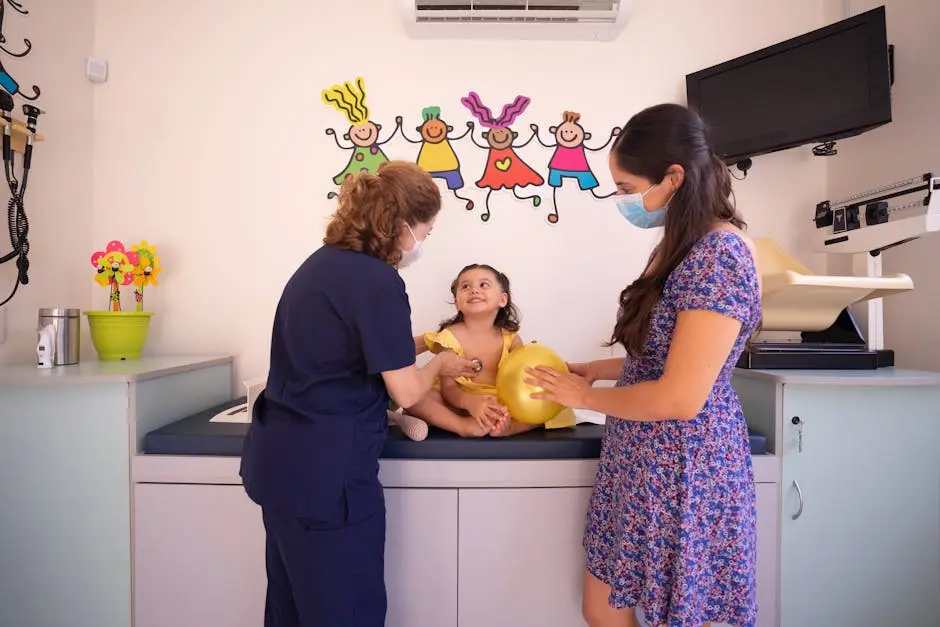Integrative pediatrics combines traditional medical practices with holistic approaches to foster a comprehensive healthcare experience for children. In today’s fast-paced medical landscape, understanding the benefits of this practice can help parents make informed choices for their children’s health. This blog will explore the principles of integrative pediatrics, its effectiveness, and how it can play a pivotal role in modern healthcare.
What is Integrative Pediatrics?
Integrative pediatrics is a holistic approach to child healthcare that blends traditional practices with alternative therapies. It views the child as a whole, considering not just the physical body but also emotional and environmental factors that can impact health. This holistic perspective is crucial, as children are complex beings, and their well-being requires an understanding of how various elements interact with each other.
At its core, integrative pediatrics prioritizes individualized care. It recognizes that children are unique, each with their own set of health needs and circumstances. As such, treatment plans are customized, taking into account the child’s medical history, family background, and even personal preferences. This methods can lead to more effective outcomes, making the healing process not just about alleviating symptoms, but fostering a robust state of well-being.
Furthermore, integrative pediatrics often emphasizes preventive care. By focusing on establishing healthy habits from an early age, healthcare providers can equip parents and children with the tools they need to maintain wellness throughout their lives. Initiatives such as nutrition education, stress management techniques, and guidance for physical activity are all important components of this preventive strategy.
The Core Principles of Integrative Pediatrics
The core principles of integrative pediatrics revolve around treating the whole child and not just their ailments. One of the fundamental concepts is the partnership between the caregiver and the family. This collaboration fosters an environment where health choices are made together, ensuring that families feel empowered and informed every step of the way.
Another cornerstone is the use of evidence-based methods. Integrative pediatrics embraces both conventional medicine and complementary therapies, but it doesn’t overlook the importance of scientific research. Providers seek to base their practices on sound evidence, ensuring that children receive the best care possible. Traditional treatments are made more effective when integrated with nutritional support, physical activity, or stress-relief practices.
A robust support system is also critical in integrative pediatrics. This approach does not rely solely on medical interventions; it encourages the involvement of various specialists, including nutritionists, psychologists, and physical therapists. By involving a range of experts, integrative pediatrics ensures comprehensive care that addresses all aspects of a child’s health.
Comparing Traditional Pediatrics and Integrative Approaches
When contrasting traditional pediatrics with integrative approaches, one can see distinct differences in philosophy and methodology. Traditional pediatrics often focuses primarily on diagnosing and treating specific illnesses or symptoms. While this method is valuable for acute issues and emergencies, it may lack the broader perspective needed for chronic conditions or developmental concerns.
In contrast, integrative pediatrics takes a more expansive view, examining lifestyle, emotional health, and environmental influences. This holistic lens not only treats existing health concerns but also aims to optimize health and prevent future problems. For instance, instead of merely prescribing medication for allergies, an integrative pediatrician might recommend dietary changes, allergy testing, and stress-reduction techniques.
Moreover, while traditional pediatrics may sometimes overlook the importance of alternative therapies, integrative approaches welcome them. Techniques such as acupuncture, homeopathy, and mindfulness exercises can be harmoniously combined with conventional practices. This synergy often leads to improved health outcomes and a more comfortable experience for children and their families.
The Role of Nutrition in Integrative Pediatrics
Nutrition is a vital component of integrative pediatrics, directly influencing a child’s overall health and development. A well-balanced diet supports not only physical growth but also cognitive function and emotional well-being. Integrative pediatricians emphasize the importance of whole foods, avoiding processed items that can lead to various health issues, including obesity and behavioral problems.
Parents are encouraged to involve their children in meal planning and preparation. This cooperative approach can instill a sense of responsibility and awareness about food choices, creating lifelong habits centered around nutrition. Moreover, educating families about local produce and seasonal eating can enhance the nutritional quality of meals while also supporting sustainable practices.
This combination of education and engagement leads to healthier choices and better outcomes. A child who learns about the nutritional value of foods is more likely to make healthier choices independently. Furthermore, integrative pediatricians may also utilize specific dietary strategies to mitigate symptoms of various conditions, such as ADHD or food allergies, tailoring nutritional interventions to meet individual needs.
Stress Management and Mental Wellness in Children
In today’s world, stress can manifest in children more than ever before. From academic pressures to social dynamics, kids face numerous stressors that can negatively impact their mental and emotional health. Integrative pediatrics addresses these concerns head-on, focusing on preventive mental wellness strategies to foster resilience and emotional intelligence.
Mindfulness techniques, such as meditation and breathing exercises, can be woven into a child’s daily routine. These practices not only help in managing stress but also cultivate a sense of calm and focus. Integrative pediatricians often guide families on how to incorporate these techniques into their lives, offering tools for emotional regulation that children can carry into adulthood.
Moreover, building open communication within families provides a strong support network for children. Encouraging kids to express their feelings and concerns can alleviate stress while promoting emotional literacy. Integrative pediatrics advocates for the importance of family discussions around mental health, ensuring children feel understood and supported.
Integrative Treatments: What Parents Need to Know
As parents explore the world of integrative pediatrics, it is essential to be aware of the various treatment options available. Integrative treatments can range from dietary interventions, physical activity programs, to alternative therapies like acupuncture and chiropractic care. It’s crucial for parents to understand how these methods complement traditional medical approaches rather than replacing them.
Before embarking on any alternative therapy, parents should engage in thorough research and consult with healthcare providers. Questions about the qualifications of practitioners, the safety of treatments, and their evidence of effectiveness are pertinent. An informed decision can greatly enhance a child’s health journey, ensuring all aspects of their care align and support one another.
Incorporating integrative treatments requires a collaborative effort between parents and healthcare providers. Open dialogue about goals, concerns, and experiences can empower parents to make the best choices for their children. This shared decision-making process fosters trust and confidence, enabling families to navigate the diverse landscape of pediatric healthcare effectively.
Finding the Right Integrative Pediatrician
Finding the right integrative pediatrician can be a transformative step in enhancing a child’s health journey. Parents should look for practitioners who not only have standard medical training but are also well-versed in integrative techniques. Credentials and experience in alternative methods should be part of the selection criteria. A trustworthy pediatrician will be open to discussing various treatment options and answer any questions or concerns.
Parent reviews and testimonials can be incredibly valuable when choosing the right integrative pediatrician. Hearing from other families who have experienced positive outcomes can build confidence in the chosen provider. Additionally, scheduling an initial consultation helps parents gauge the fit between their family’s needs and the pediatrician’s philosophy.
Ultimately, the best pediatrician is one who resonates with the family’s values and fosters a collaborative relationship centered around the child’s well-being. A supportive environment encourages ongoing dialogue about health decisions and inspires parents to actively partake in their child’s health care journey.
Embracing Integrative Pediatrics for Holistic Child Health
Integrative pediatrics offers a unique and effective approach to children’s health, combining the best of conventional medicine with holistic methods. By focusing on the integration of mind, body, and spirit, it not only addresses physical ailments but also promotes overall well-being. As parents seek comprehensive care for their children, understanding and embracing integrative pediatrics can lead to healthier, happier lives.

